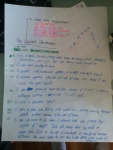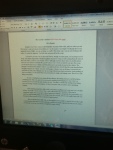“How to Get a Short Story Published | How to Publish a Short Story.” WritersDigest.com. Writer’s Digest, 31 Jan 2012. Web. 20 Oct. 2012.
—
So, I have found what is possibly the best website resource I could have possibly found. These are the most important parts of what I got from it (all bolding mine):
“Getting your short story published in a reputable literary journal or magazine is a great way to get noticed as a fiction writer.” This is good, considering one of my possible future career choices is fiction writing. Having a story out would be beneficial to me in the future.
“There are tons of literary journals out there, from small one-person operations that pay in contributor’s copies to big glossy magazines that will pay cash for your story. It’s important to do your research when setting out to submit your story to them. You want to make sure the magazine or journal has a good reputation—even better if it’s won some awards. And remember, getting paid is great, but sometimes the exposure you receive is the best payment—so don’t limit yourself to only paying markets.” This encourages me to investigate the market. Of course, I am already doing some research on it–that is the point of this journal entry–but when I choose publications to send my story to, I don’t have to limit myself to big ones that most people have heard of. I could try something smaller, and get some recognition for it, which for me–at least at this point in my life, when I’m in high school and live with my parents–is more important than money.
“First and foremost, read the submission guidelines. Sending your bodice ripper romance story to a literary journal for hard core science fiction readers will land your submission in the trash. Bottom line: make sure you’re targeting the right kind of publication.” Of course, I already knew this one–but it is a good reminder and a good rule of thumb to follow.
“By reading the magazine first you can get a feel for the tone of the publication and you can decide whether or not your story is a good fit—or tailor it to be.” This is good advice, indicating me to read the publications I am submitting my story to. Another one that should seem logical, but isn’t always obvious.
“Include a cover letter for your story that briefly describes what the story is about. This is a short pitch of approximately 25 words that explains who the main character (or characters) is and what the conflict of the story is about. Keep it short. This isn’t a synopsis.” This is great–I had no idea it would be helpful to send something like this along with the submission itself.
“Address your cover letter to the editor by name. Do your research and make sure you spell their name correctly.” Another one I did not know I was supposed to do.
“List the word count of your story.” This is also really helpful. One thing I liked about this web resource is that it wasn’t some blurry, dubious post about writing about what you love and some less-than-helpful advice on keeping it short; this is actually a set of clear guidelines that I can follow.
“Avoid using any sort of fancy fonts or typefaces.” I’m guilty of doing this on the stories that I will keep for myself, although I do understand this isn’t acceptable when it comes to actually submitting something for real people to actually read.
“Avoid clichés, such as beginning with your character waking up from a dream.” Now, we’re getting into the actual writing territory. This one’s pretty obvious, but still a valuable reminder.
“Use simple dialogue tags. “He said” and “she said” are best. Don’t make the mistake of thinking they’re boring. Tags like “he orated” draw attention away from the dialogue itself.” I have it drilled into my head that using “he said” and “she said” too much are perverse, horrible mistakes that should NEVER be committed. Therefore, this one’s very useful and, in something as short as a short story, I can see how it would draw attention away from the actual dialogue.
“Be careful with modifiers. When it comes to adjectives a little goes a long way. For adverbs—remember that rule even more so. Your short story should be exactly that—short. Don’t crowd it with unnecessary words.” I do understand that since this is a short story, I should be concise and straight to the point–although I do tend to be a very descriptive sort of person, so this rule is something I need to keep in mind at all times.







